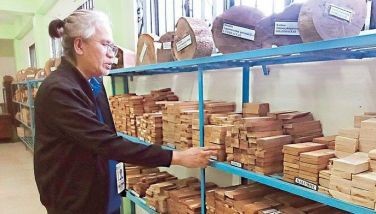Stop jueteng or be relieved, PNP officers warned
August 21, 2006 | 12:00am
Following reports of the resurgence of jueteng and alleged involvement of police officials, Philippine National Police (PNP) chief Director General Oscar Calderon has issued a stern warning to police unit commanders to sustain their campaign against illegal gambling or face immediate relief.
"We will prove our detractors wrong by waging a more aggressive and thorough sweep of jueteng activities and other forms of illegal gambling," Calderon vowed yesterday.
The Department of the Interior and Local Government (DILG), which is responsible for the PNP, asked local government units and non-government organizations yesterday to support the police force’s effort to win back the people’s trust and build up its capacity as a premiere law enforcement organization.
Interior Secretary Ronaldo Puno gave his full backing to the ongoing integrated transformation program (ITP) of the PNP, which he described as a "roadmap for reforms" for the national police.
"I would support the PNP leadership in the best way I can in making sure that your resources are adequate and in keeping your morale high," said Puno, who is also chairman of the National Police Commission.
"On your end, I ask that you (PNP) remain steadfast in pursuing genuine PNP transformation," he said.
An anti-gambling watchdog earlier alleged that some police officials are themselves operating jueteng, an illegal numbers game popular among the masses.
Sources said a former ranking PNP official, who is planning to seek an elective post in next year’s polls, has taken over the operation of jueteng in "coordination" with some police officials in the northern part of the country.
Calderon protested, saying: "This dismal accusation somehow taints the integrity of the PNP in its drive to stamp out illegal gambling in the country."
Subsequently, the PNP chief issued his first memorandum on jueteng since assuming office on July 5, ordering 17 police regional commanders to conduct a relentless drive against it "to stop this illegal activity once and for all and at the soonest possible time."
"Regional directors, provincial directors, and chiefs of police found to be negligent and not complying with this directive shall be henceforth relieved of their positions," he warned.
Calderon also directed the Criminal Investigation and Detection Group (CIDG) and the Anti-Illegal Gambling Special Operations Task Force (AIG-SOTF) to monitor the operation of jueteng nationwide.
In his memorandum, Calderon reminded police officials of the strict implementation of the "1-3-2 Strike Policy" on unit commanders who are found remiss in their duty to stop jueteng.
The 1-3-2 strike policy means a police chief will be relieved if CIDG or AIG-SOTF discovers any operation of jueteng.
A provincial director would be axed if three of his police chiefs are relieved for jueteng. A regional director would be relieved if two of his provincial directors are sacked for failure to stop jueteng.
During the term of Calderon’s predecessor Director General Arturo Lomibao, no regional director was sacked — only police chiefs and provincial directors.
PNP records showed a total of 1,281 illegal gambling offenders in 794 operations conducted nationwide during the first quarter of this year alone.
The arrests resulted in the filing of 710 cases in court for violation of Presidential Decree 1602 and Republic Act 9287 which impose stiffer penalties of up to ten years imprisonment for collectors and up to 20 years for protectors or coddlers.
Almost 40 police commanders had been relieved from post because of jueteng.
According to the DILG, the ITP would help strengthen the PNP’s capability to maintain public order and safety and enhance the welfare of members of the police force over a 10-year period.
The PNP-ITP, which was first conceptualized in 2003 and developed through a comprehensive study funded by the government and the United Nations Development Program (UNDP), was launched last year.
One of the major concerns in the PNP’s performance is its capability to fight crimes. Puno pointed out that the PNP’s effectivity on this is seriously hampered by the lack of police stations, patrol vehicles, firearms, fuel and motor supplies and communications equipment.
The ITP also aims to strengthen police education and training; establish a PNP Pension and Insurance Corp.; decentralize administrative and financial management; formulate and implement a Crime Indicators System; develop a Crime Management Information database; and widen partnerships between the PNP and the community, he added.
Also quoting studies made by the National Economic and Development Authority, Puno said 60 percent of PNP members live below the poverty line, while 62 percent lack decent shelter.
Calderon has created a committee on housing to coordinate with the national government in assessing available lots for a low-cost housing project.
"We will prove our detractors wrong by waging a more aggressive and thorough sweep of jueteng activities and other forms of illegal gambling," Calderon vowed yesterday.
The Department of the Interior and Local Government (DILG), which is responsible for the PNP, asked local government units and non-government organizations yesterday to support the police force’s effort to win back the people’s trust and build up its capacity as a premiere law enforcement organization.
Interior Secretary Ronaldo Puno gave his full backing to the ongoing integrated transformation program (ITP) of the PNP, which he described as a "roadmap for reforms" for the national police.
"I would support the PNP leadership in the best way I can in making sure that your resources are adequate and in keeping your morale high," said Puno, who is also chairman of the National Police Commission.
"On your end, I ask that you (PNP) remain steadfast in pursuing genuine PNP transformation," he said.
An anti-gambling watchdog earlier alleged that some police officials are themselves operating jueteng, an illegal numbers game popular among the masses.
Sources said a former ranking PNP official, who is planning to seek an elective post in next year’s polls, has taken over the operation of jueteng in "coordination" with some police officials in the northern part of the country.
Calderon protested, saying: "This dismal accusation somehow taints the integrity of the PNP in its drive to stamp out illegal gambling in the country."
Subsequently, the PNP chief issued his first memorandum on jueteng since assuming office on July 5, ordering 17 police regional commanders to conduct a relentless drive against it "to stop this illegal activity once and for all and at the soonest possible time."
"Regional directors, provincial directors, and chiefs of police found to be negligent and not complying with this directive shall be henceforth relieved of their positions," he warned.
Calderon also directed the Criminal Investigation and Detection Group (CIDG) and the Anti-Illegal Gambling Special Operations Task Force (AIG-SOTF) to monitor the operation of jueteng nationwide.
In his memorandum, Calderon reminded police officials of the strict implementation of the "1-3-2 Strike Policy" on unit commanders who are found remiss in their duty to stop jueteng.
The 1-3-2 strike policy means a police chief will be relieved if CIDG or AIG-SOTF discovers any operation of jueteng.
A provincial director would be axed if three of his police chiefs are relieved for jueteng. A regional director would be relieved if two of his provincial directors are sacked for failure to stop jueteng.
During the term of Calderon’s predecessor Director General Arturo Lomibao, no regional director was sacked — only police chiefs and provincial directors.
PNP records showed a total of 1,281 illegal gambling offenders in 794 operations conducted nationwide during the first quarter of this year alone.
The arrests resulted in the filing of 710 cases in court for violation of Presidential Decree 1602 and Republic Act 9287 which impose stiffer penalties of up to ten years imprisonment for collectors and up to 20 years for protectors or coddlers.
Almost 40 police commanders had been relieved from post because of jueteng.
According to the DILG, the ITP would help strengthen the PNP’s capability to maintain public order and safety and enhance the welfare of members of the police force over a 10-year period.
The PNP-ITP, which was first conceptualized in 2003 and developed through a comprehensive study funded by the government and the United Nations Development Program (UNDP), was launched last year.
One of the major concerns in the PNP’s performance is its capability to fight crimes. Puno pointed out that the PNP’s effectivity on this is seriously hampered by the lack of police stations, patrol vehicles, firearms, fuel and motor supplies and communications equipment.
The ITP also aims to strengthen police education and training; establish a PNP Pension and Insurance Corp.; decentralize administrative and financial management; formulate and implement a Crime Indicators System; develop a Crime Management Information database; and widen partnerships between the PNP and the community, he added.
Also quoting studies made by the National Economic and Development Authority, Puno said 60 percent of PNP members live below the poverty line, while 62 percent lack decent shelter.
Calderon has created a committee on housing to coordinate with the national government in assessing available lots for a low-cost housing project.
BrandSpace Articles
<
>
- Latest
- Trending
Trending
Latest
Trending
Latest
Recommended






























